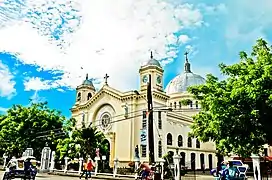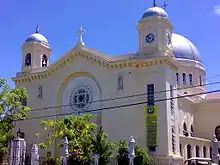San Diego Pro-Cathedral, Silay
The San Diego Pro-cathedral, formerly known as the San Diego Parish Church or the St. Didacus Parish Church before its declaration as a pro-cathedral in 1994, is an early 20th-century church in Silay City, Negros Occidental in the Philippines. It is the only pro-cathedral in the country[1] and is unique in Negros Occidental for being the only church in the province featuring a cupola or dome.
| San Diego Pro-Cathedral Procatedral de San Diego | |
|---|---|
 The San Diego Pro-Cathedral is the pro-cathedral of the Roman Catholic Diocese of Bacolod | |
| Religion | |
| Affiliation | Roman Catholic |
| Ecclesiastical or organizational status | Pro-cathedral |
| Year consecrated | 1776 |
| Status | active |
| Location | |
| Location | Silay City, Negros Occidental, Philippines |
| Geographic coordinates | 10.800153°N 122.975839°E |
| Architecture | |
| Architect(s) | Lucio Bernasconi |
| Type | Church |
| Style | Romanesque |
| Groundbreaking | 1925 |
| Completed | 1927 |
| Materials | concrete |
History
The parish of Silay was established in 1776 and its first church was built of light materials: bamboo, cogon grass and nipa palm during the time of Gobernadorcillo Alejo Severino's administration. Padre Alejo Ignacio de Molinas, a Spaniard, was its first priest.[2] In 1841, then-parish priest Fr. Eusebio Locsin initiated the construction of a more permanent structure made of stone and wood.[3] The roof was improved through the use of galvanized iron. Further improvements were done but When the revolution broke out in November 5, 1898, the church was left unfinished.
In 1925, work began on a grander structure meant to replace the old church. Don Jose R. Ledesma, a resident of Silay and a wealthy sugar baron, donated a substantial portion of the funds needed to build the new edifice. The rest of the money was raised through popular contribution, including fund-raising by schoolchildren.[4]
Don Jose Ledesma commissioned an Italian architect, Lucio Bernasconi to design the new church. Bernasconi was also responsible for the design and construction[5] of the Silay Wharf, which was razed by Imperial Japanese soldiers during the Second World War. Bernasconi took the churches in his native Italy as the model for the Silay church. The church's layout is in the shape of a Latin cross, with a cupola rising forty meters above the nave. Construction was completed in 1927, and the new church was inaugurated that same year.
Patron saint
_San_Diego_de_Alcal%C3%A1.png.webp)
The San Diego Pro-cathedral is named in honor of Didacus of Alcalá, the Franciscan saint more commonly known in the Philippines as San Diego de Alcalá. A local historian has conjectured that San Diego was given as a patron saint to the early settlement that became Silay by Fr. Diego Gomez de Covarrubias when he became the parish priest of the neighboring settlement of Bago, and Silay was his visita – a settlement he was responsible for attending to as a visiting priest.[6]
Pro-cathedral
On December 25, 1994, then-Bishop of the Diocese of Bacolod, Monsignor Camilo Gregorio declared the San Diego Parish Church a pro-cathedral. At that time, the San Diego Parish Church was the second Catholic church to be declared a pro-cathedral in the Philippines, after the San Miguel Pro-cathedral in San Miguel, Manila, serving as a provisional co-cathedral for ready use every-time the San Sebastian Cathedral is being closed for maintenance or repair. [7]
Gallery
References
- GCatholic.org. "Cathedrals in the Philippines". Retrieved 21 October 2019.
- "The Church of San Diego". Silay City Government. Retrieved 11 November 2014.
- Tan, Christian Irl (2006-11-04). "Silay parish turns 230". The Visayan Daily Star. Retrieved 2008-05-06.
- Sa-onoy, Modesto P. (2006). Parroquia de San Diego:1776-2006. Today Printers and Publishers. pp. 117–119.
- "San Diego Building & Construction". Powered by The People. 2009-04-19.
- Sa-onoy, Modesto P. (2006). Parroquia de San Diego:1776-2006. Today Printers and Publishers. p. 16.
- "Bacolod church declared procathedral". Manila Standard. 1 January 1995. p. 15. Retrieved 11 July 2013.
External links
| Wikimedia Commons has media related to San Diego Pro-Cathedral (Silay, Negros Occidental). |
- Catholic Encyclopedia: Saint Didacus of Alcalá





